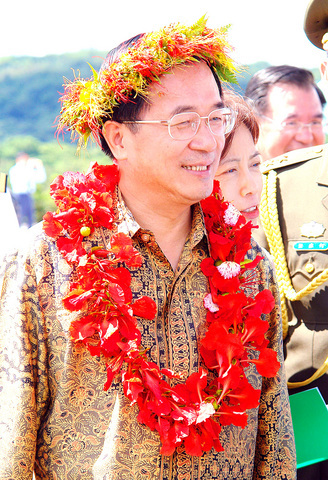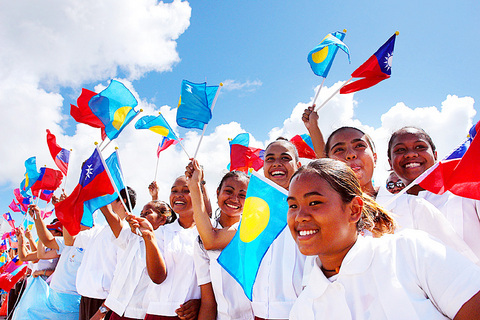President Chen Shui-bian (陳水扁) arrived in Palau yesterday on the first leg of his Pacific island tour, a journey made more significant by his use of "Air Force One" and flying over Japan's aerospace.
A record 80 senior officials, including Vice President Annette Lu (呂秀蓮), Premier Su Tseng-chang (蘇貞昌) and Legislative Speaker Wang Jin-pyng (王金平), saw Chen off at the Sungshan Air Base in Taipei yesterday.
Su said he brought the entire Cabinet to see Chen off because the president has shown "steadfastness" in demonstrating the nation's sovereignty at a time of political turmoil at home.

PHOTO: CNA
Presidential Office Deputy Secretary-General Liu Shih-fang (劉世芳), who accompanied Chen on the trip, confirmed that the president had planned to fly over Philippine air space en route to Palau and then through Japanese air space on his way home.
"However, media speculation had given China an opportunity to exert tremendous amount of pressure on the Philippines," Liu said. "We then asked the Japanese government about the possibility of flying through its airspace and obtained their approval yesterday [Saturday] afternoon."
Liu said that "Air Force One" yesterday passed through both Japanese and US air space and that was why the president extended his appreciation to the US and Japanese governments before his departure from Sungshan yesterday morning.

PHOTO: CNA
The "Air Force One" and a China Airlines plane carrying Chen's entourage and press corps took off at 8:30am. The president's plane was escorted by three F-16 jet fighters until it left the country's territorial air space.
During his three-day trip, Chen will attend a summit with the nation's six Pacific allies in Palau and is scheduled to deliver a speech to Nauru's parliament. He is due back in Taipei on Wednesday night.
When asked by reporters on "Air Force One" about his first trip on the plane, Chen said he felt "good and pleased."
Before departing Taipei, Chen delivered a speech at the air base, describing the trip as "a small step for Air Force One, but a giant step for `head of state' diplomacy.'"
"Air Force One is different from a commercial flight because it represents the nation's sovereignty," he said. "Former presidents did not take Air Force One on their overseas trips for technical or political reasons. Now we have the opportunity to use it, there is no reason not to take advantage of it."
Chen said the nation's international presence faces brazen suppression by China, but this does not mean that Taiwan must forsake its dignity and the right to pursue international activities.
Chen met with Palauan President Tommy Remengesau at the Presidential Office immediately after his arrival in Palau.
During the 30-minute meeting, Remengesau expressed gratitude to Chen, saying that the Taiwanese leader helped boost Palau's scuba diving industry by 42 percent. Chen took a scuba dive during a visit last January.
Chen, who is scheduled to participate in a fishing contest tomorrow, said that he hoped to catch a big fish so that the whole world would know that Palau is a good place to fish.
In a reference to his guest's domestic political woes, Remengesau said that he could empathize with Chen because he himself is facing call for his resignation following a fierce presidential election.
Later in the afternoon, Chen held bilateral talks with leaders of other allies, including President Kessai Note of Marshall Islands, Prime Minister Apisai Ielemia of Tuvalu and Solomon Islands Prime Minister Manasseh Sogavare.
Chen said he hoped that all six Pacific allies would be able to attend next year's summit in Majuro, Marshall Islands.
At the dinner party hosted by Remengesau last night, Chen said that his administration looks forward to establishing long-term cooperation and close interactions with the nation's allies for the development and prosperity of all.
also see stories:
Chen chides Ma over sit-in approval
Anti-Chen group cancels warmup
Pro-Chen group to hold preemptive rally

Taiwan yesterday denied Chinese allegations that its military was behind a cyberattack on a technology company in Guangzhou, after city authorities issued warrants for 20 suspects. The Guangzhou Municipal Public Security Bureau earlier yesterday issued warrants for 20 people it identified as members of the Information, Communications and Electronic Force Command (ICEFCOM). The bureau alleged they were behind a May 20 cyberattack targeting the backend system of a self-service facility at the company. “ICEFCOM, under Taiwan’s ruling Democratic Progressive Party, directed the illegal attack,” the warrant says. The bureau placed a bounty of 10,000 yuan (US$1,392) on each of the 20 people named in

The High Court yesterday found a New Taipei City woman guilty of charges related to helping Beijing secure surrender agreements from military service members. Lee Huei-hsin (李慧馨) was sentenced to six years and eight months in prison for breaching the National Security Act (國家安全法), making illegal compacts with government employees and bribery, the court said. The verdict is final. Lee, the manager of a temple in the city’s Lujhou District (蘆洲), was accused of arranging for eight service members to make surrender pledges to the Chinese People’s Liberation Army in exchange for money, the court said. The pledges, which required them to provide identification

Nine retired generals from Taiwan, Japan and the US have been invited to participate in a tabletop exercise hosted by the Taipei School of Economics and Political Science Foundation tomorrow and Wednesday that simulates a potential Chinese invasion of Taiwan in 2030, the foundation said yesterday. The five retired Taiwanese generals would include retired admiral Lee Hsi-min (李喜明), joined by retired US Navy admiral Michael Mullen and former chief of staff of the Japan Self-Defense Forces general Shigeru Iwasaki, it said. The simulation aims to offer strategic insights into regional security and peace in the Taiwan Strait, it added. Foundation chair Huang Huang-hsiung

’DISTORTION’: Beijing’s assertion that the US agreed with its position on Taiwan is a recurring tactic it uses to falsely reinforce its sovereignty claims, MOFA said The Ministry of Foreign Affairs (MOFA) yesterday said Chinese state media deliberately distorted Taiwan’s sovereign status, following reports that US President Donald Trump agreed to uphold the “one China” policy in a phone call with Chinese President Xi Jinping (習近平). During the more than one-hour-long call, Xi urged Trump to retreat from trade measures that roiled the global economy and cautioned him against threatening steps on Taiwan, a Chinese government summary of the call said. China’s official Xinhua news agency quoted Xi as saying that the US should handle the Taiwan issue cautiously and avoid the two countries being drawn into dangerous